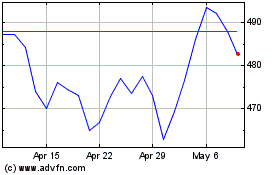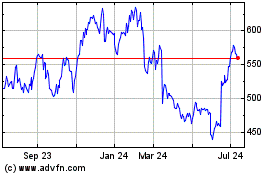Acquisition of Tableau marks its biggest ever, as competition
heats up in data analytics
By Asa Fitch and Kimberly Chin
This article is being republished as part of our daily
reproduction of WSJ.com articles that also appeared in the U.S.
print edition of The Wall Street Journal (June 11, 2019).
Salesforce.com Inc. agreed to buy data-analytics platform
Tableau Software Inc. for more than $15 billion in stock, making
its largest-ever acquisition as it fights off rivals challenging
its dominance in software that helps companies understand their
customers.
The San Francisco company has made many pricey acquisitions in
recent years, aimed at broadening the tools and services it offers.
But none of the deals have been close to the size of Tableau, a
leader in software that creates visualizations of large data sets
that businesses can use to spot trends and make decisions.
Salesforce has built a powerful software business with over $13
billion in annual revenue by helping companies ditch legacy
computer systems and move data to the cloud. Tableau, however,
makes most of its money selling software installed on customers'
own computers, expanding Salesforce's reach but also putting it in
less-familiar territory.
Salesforce is paying a 42% premium over Tableau's closing share
price on Friday, indicating an urgency to both defend and extend
its turf. The acquisition is the fourth-largest technology deal
globally this year, according to Dealogic data, behind a trio of
financial-technology deals.
While Salesforce is the world's biggest seller of so-called
customer relationship management software, competitors including
Microsoft Corp. and Adobe Inc. have gained ground in recent years.
Salesforce has around a 20% market share, according to
International Data Corp.
"Microsoft is making gains overall in the market, and this is a
way for them to strike back," said Steve Koenig, an analyst at
Wedbush Securities.
"It extends their rivalry from [customer-relationship
management] to the heart of the analytics market."
Salesforce investors reacted negatively to the deal on Monday,
sending the company's shares down 5.2% to $152.79, after they had
risen 12% for the year. Analysts said the fall reflected concerns
about the price Salesforce paid and share dilution as a result of
the all-stock purchase.
Shares of Tableau jumped 33% to $167.41, putting them up 40% for
the year.
Salesforce has performed strongly in recent quarters, including
this month reporting record revenue for its most recent period. But
it has also faced struggles, among them a service outage in May for
some customers that lasted several days.
World-wide spending on technologies and services to move
companies into the digital age is expected to reach $1.8 trillion
by 2021, Salesforce said, citing data from IDC.
And other technology companies are also looking to get into the
business-intelligence and data-analytics business. Last week,
Alphabet Inc.'s Google acquired Looker for $2.6 billion to help it
mine large caches of data for insights. Microsoft has gone shopping
to bolster its cloud business Azure, which has given its top line a
big boost in the past year.
Last year, Salesforce bought web-based service MuleSoft Inc. in
a $6.5 billion deal, as it sought to migrate more clients to cloud
services. The company also bought e-commerce platform Demandware
Inc. for $2.8 billion in 2016.
Software from Tableau, which was founded in 2003, allows
companies to build databases, spreadsheets, graphs and maps from
their data. More than 86,000 organizations globally work with
Tableau, the company said. Tableau's clients include Charles Schwab
Corp., Verizon Communications Inc. and Southwest Airlines Co. It
generated $1.16 billion in revenue last year.
"With Tableau, we can go to every single department and every
single user and enable them to help see and understand data," Bret
Taylor, Salesforce's president and product chief, said on a
conference call Monday.
In 2016, The Wall Street Journal reported that Tableau was
referenced on a leaked internal presentation that showed a list of
potential Salesforce merger and acquisition targets. Salesforce
said at the time it would "routinely survey the industry landscape
across a wide range of companies, but acquire very few."
On Monday, Marc Benioff, Salesforce chairman and co-CEO, said he
has long had a deep admiration for Tableau. Mr. Benioff said that
when he speaks with clients, "we're talking about all the different
products they're using: Sales Cloud and Service Cloud and Marketing
Cloud, and they're using all of our various capabilities. And then
they'll start talking about how they're using Tableau."
Tableau will continue to operate independently under its own
name and under the current leadership team led by Adam Selipsky,
the companies said. Also, it will remain based in Seattle, which
Mr. Benioff said will become Salesforce's second headquarters.
Salesforce said it would combine Tableau's capabilities with
Salesforce Einstein, its artificial intelligence-powered platform,
which would help provide services at every touchpoint of sales,
marketing, service and commerce for customers.
The transaction, which Salesforce aims to complete by the end of
October, is expected to add $350 million to $400 million to the
company's revenue in the current fiscal year. Sales for the year
ending Jan. 31 are projected at between $16.45 billion and $16.65
billion.
Write to Asa Fitch at asa.fitch@wsj.com and Kimberly Chin at
kimberly.chin@wsj.com
(END) Dow Jones Newswires
June 11, 2019 02:47 ET (06:47 GMT)
Copyright (c) 2019 Dow Jones & Company, Inc.
Adobe (NASDAQ:ADBE)
Historical Stock Chart
From Mar 2024 to Apr 2024

Adobe (NASDAQ:ADBE)
Historical Stock Chart
From Apr 2023 to Apr 2024
